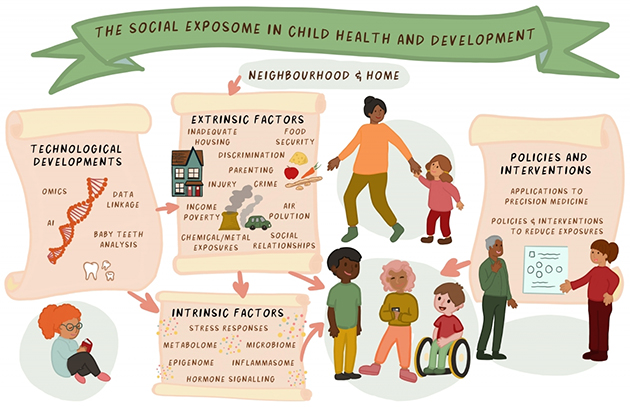
The Social Exposome Banner by Carina Nilsson
UBC Psychology researchers Kiran Soma and Anita DeLongis are members of a new research cluster at UBC, the Social Exposome Cluster. This collaborative, cross-discipline research partnership will study how children’s health and development are impacted by their social, physical, and psychological exposures.
Led by Michael Kobor, professor of medical genetics at UBC, the Social Exposome Cluster bridges scientists and experts in medicine, public and population health, policy development, and the natural and social sciences. With four research themes, the researchers will use an evidence-based approach to develop interventions and policies to reduce disparities in child health and to boost the wellbeing of children.
Kiran Soma investigates how steroid hormones regulate the nervous system and immune system. Multidisciplinary research collaborations are at the core of his research and through the cluster he is developing a novel way to measure prior exposure to stress during early—and even prenatal—life by measuring stress hormones in “baby teeth” after they fall out naturally.
Anita DeLongis is currently studying preschool age children across time to monitor family stress, ways of coping, and wellbeing outcomes for parents and their children. With the support of the cluster, she is now able to assess biomarkers of stress in the children by adding hair analysis.
“This allows us to explore how stress gets under the skin, to examine the impact of family and marital stress—as well as stress experienced by the parents at work—on the children. The expertise brought together on the cluster is facilitating work that could not be done without this collaboration.” —Anita DeLongis

Kim Schmidt
Kim Schmidt, UBC Psychology and Soma Lab alumna, is also a cluster member. Schmidt is the research manager of the Healthy Starts Theme at the BC Children’s Hospital Research Institute. In this role, she supports research that focuses on understanding how our environments shape our health. This includes the unique nutritional needs of children, how vaccines protect against infection, how social conditions impact gene expression, and more.
Working in the Soma Lab as an undergraduate student sparked Schmidt’s interest in research. Throughout her training, her research focused on the effects of variation in the early-life environment on physiology and behaviour and the biological mechanisms by which early-life exposures have long-lasting neural and physiological effects.
“I am especially proud to see Kim Schmidt, an undergraduate and MSc student in my lab, participate in this exciting project. Kim studied early-life stress in my lab and is perfectly suited to participate and help organize this project.” —Kiran Soma
After receiving her BA degree in Psychology and MSc in Neuroscience at UBC, Schmidt completed her PhD in Biology from Western University. In a Q&A, she shares her experiences as psychology student, how UBC shaped her career, and what’s on the horizon for the research cluster.
What is your role as Healthy Starts Theme Research Manager?
As the Healthy Starts Theme Research Manager at the BC Children’s Hospital Research Institute, I engage with over 70 investigators, as well as trainees and other staff members, to help facilitate research projects and activities for the Healthy Starts Theme. The theme itself is diverse and researchers study a number of topics focused on understanding how our environments shape our health including studying the unique nutritional needs of children, the mechanisms by which vaccines protect against infection, how social conditions impact gene expression, how pregnancy complications can have lifelong consequences for development, and more. I oversee a number of activities in the theme including managing the budget and operational expenses, planning research seminars and workshops, writing and submitting funding proposals, communications activities such as writing newsletters, updating websites, and maintaining social media sites, to name just a few. Essentially, I aim to do whatever is needed to help people be successful in their research and to bring recognition and success to our theme.
What excites you about being a part of this cluster?
What excites me most about the cluster is how interdisciplinary it is. We have faculty and trainees from seven faculties at UBC and many departments. It is very exciting to interact with such a diverse group of researchers with different expertise and perspectives and it enables some very collaborative, creative and unique research projects and approaches. I think this sort of interdisciplinary research is key for addressing critical societal challenges as the Social Exposome Research Cluster aims to do. The traditional approach of working in disciplinary silos is not as impactful, in my opinion.

The Social Exposome Infographic by Carina Nilsson and Sam Bradd
What’s on the horizon for the cluster? How can others get involved?
Right now, our goal is to refine our research priorities and develop a strategic plan that will enable us to achieve our objectives and have maximal impact. A big component of this is establishing new partnerships, both with academic researchers but also with relevant community and government groups with an interest in child health and development. We welcome queries from anyone who is interested in the Cluster’s activities including attending our events or those interested in collaborating with one of our members. Anyone interested can check out the “contact us” page on our website.
In your experience, how does the value of a psychology degree translate into the real world?
I think pursuing a psychology degree trains students in many areas and skills that are important for a number of career paths. I was able to take courses that taught me the scientific method and statistical analyses that helped me refine by critical thinking and writing skills. I think there are few programs in undergrad that provide this comprehensive skill set and I think this is because psychology combines a lot of both the sciences and the arts. I also think it provides an excellent basis for anyone pursuing a career with an interdisciplinary focus. I was able to learn about neurobiology, clinical psychology, child development, animal behaviour, as well as to take more specialized classes, like neuroendocrinology and pschoneuroimmunology that allowed me to develop and explore my own interests.
I also think a psychology degree enables a great understanding of human beings and what makes us think and act the way we do. This is incredibly beneficial for strengthening interpersonal skills in the workplace and also in one’s personal life for interacting with friends and family. Especially now, as a mother to young children, I find myself often reflecting on what I learned about cognitive, social, and emotional development in my psychology classes and I think that understanding the ways children learn and develop has enabled me to be more patient and to better support my children as they grow.
Was there anything or anyone who inspired you, during your time as a psychology student?
I had many wonderful professors and instructors in the psychology department during the completion of my degree. Two professors in particular had a lasting impact. First, Don Wilkie, who led the Honours Program in Psychology, was a great mentor. He really invested a lot in the Honours program and provided us with so much information on research and fellowship opportunities and great advice about pursuing graduate studies. Often undergrads aren’t exposed to this kind of information first hand, and this was tremendously beneficial. The second would be my Honour’s thesis supervisor, Kiran Soma. He took me on as a student even though I had no research experience and this was such a beneficial experience. Unlike in a lot of labs where undergrads are just paired with a graduate student or postdoc to help on a project, Kiran gave me my own project. Being responsible for a project from start to finish, including reviewing the literature, thinking about designing the methods and approach, analyzing the data, etc., provided incredible training and a solid foundation on which to build my own research career. He also had a fantastic group of graduate students at the time that were wonderful mentors and the members of his lab were all so close and helpful to each other. Not only did I get a great start to my career by working in his lab but I also made lifelong friends.
In your own words, how has UBC shaped your career?
In many ways, it feels like I came to UBC as an undergrad in 2004 and never really left! Although I did leave to complete my PhD in Ontario, but even during that time I kept up collaborations at UBC and still spent a lot of time here. I love UBC and find it a fantastic place to work. There are many career opportunities at UBC for people interested in science and research. I admire that UBC encourages collaborations, interdisciplinary research and that it has recently increased its efforts to foster equity, diversity, and inclusion. I think attending UBC for my undergrad enabled me to develop my love of science, psychology, biology, and research because there were so many interesting courses to take and such great opportunities for undergrads to be involved in research. In particular, I think that exposure to research early on in my academic training had a tremendously beneficial effect on my education and career path. I really had no idea what research even was before I joined Dr. Kiran Soma’s lab for my BA Honours project and it was such a fantastic and beneficial experience. Since that time, I knew I would have some sort of career in research.
Connect with the Social Exposome Cluster
Follow the cluster on Twitter (@SocialExposome) for news and updates. If you are interested in connecting with the cluster to collaborate, contact them via their website.
UBC Research Excellence Clusters bring together researchers across a wide range of faculties and departments at the University of British Columbia to collaborate on and advance a particular area of research. Launched in 2016, the UBC Research Excellence Clusters program is supported by the Office of Vice-President, Academic and Provost and the Vice-President, Research and Innovation, with financial contributions from the UBC Excellence Fund.